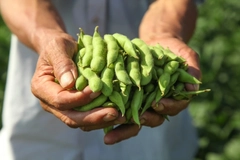
- Industry news
Industry news
- Category news
Category news
- Reports
- Key trends
- Multimedia
- Journal
- Events
- Suppliers
- Home
- Industry news
Industry news
- Category news
Category news
- Reports
- Key trends
- Multimedia
- Events
- Suppliers
Future farming: Japanese innovation powers edamame production in urban spaces
Key takeaways
- Researchers have developed a hydroponic system using LED lighting for year-round edamame production, overcoming seasonal and geographic limitations.
- The nutrient film technique method surpasses open-field cultivation in yield and nutritional content.
- The system offers scalable and climate-independent solutions for urban agriculture and long-term applications in space missions.

Researchers in Japan have developed a hydroponic cultivation system utilizing LED lighting to produce fresh, high-quality edamame throughout the year. The “artificial light-type plant factory” grows the legume in urban buildings, deserts, and even outer space — a step toward a future where sustainable agriculture is “no longer bound by season or geography.”
Artificial light-type plant factories allow producers to grow crops year-round by adjusting factors such as light, temperature, humidity, carbon dioxide concentration, and nutrient delivery. This leads to stable yields “independent of climate conditions,” explain the scientists at Hosei University and the University of Tokyo, who conducted the study.
The study builds on the team’s previous work cultivating tomatoes under LED lighting in a plant factory, prompting focus on edamame, a high-protein legume consumed globally.
They utilized the nutrient film technique (NFT) for edamame yields that surpassed those of open-field cultivation, primarily due to the production of more pods and seeds.
“Recent global warming and extreme weather events have raised concerns about reduced yields in open-field crop production. Our hydroponics technology offers a promising model for urban agriculture independent of climate conditions,” says Professor Toshio Sano from the Faculty of Bioscience and Applied Chemistry at Hosei University.
Overcoming quality challenges
Edamame is usually harvested during summer, but its freshness deteriorates rapidly, making distribution and long-term storage difficult, notes the study, published in Scientific Reports.
To overcome these barriers, the team compared three hydroponic systems: NFT, rock wool culture (ROC), and mist culture (MIST).
NFT provided the most vigorous plant growth, producing stronger stems, healthier leaves, and greater biomass than other hydroponic methods and traditional open-field cultivation — indicating that the method can be used for cultivating edamame indoors and achieving “higher productivity than conventional farming.”
Elevating taste and health benefits
A quality comparison of different cultivation methods revealed that plants grown using NFT had a higher sucrose content, resulting in stronger sugar content compared to edamame grown in fields.
 The hydroponic system’s scalability offers potential in feeding astronauts during long-term outer space missions.“While free amino acid levels were slightly lower, the NFT method produced significantly higher levels of isoflavones, compounds known for their health benefits,” note the researchers. They suggest that LED lighting may stimulate the synthesis of these bioactive components for higher nutritional value compared to open-field cultivation.
The hydroponic system’s scalability offers potential in feeding astronauts during long-term outer space missions.“While free amino acid levels were slightly lower, the NFT method produced significantly higher levels of isoflavones, compounds known for their health benefits,” note the researchers. They suggest that LED lighting may stimulate the synthesis of these bioactive components for higher nutritional value compared to open-field cultivation.
This combination offers better taste and elevated health-promoting compounds, which the team claims “advances food quality” through controlled agricultural environments.
The NFT method also fared the highest in yield, sugar content, and nutritional value evaluations. The technique can be used for vertical, multi-layered growing systems, suitable for urban environments where land is scarce.
Outer space potential
The team emphasizes that the method’s scalability, combined with year-round production capability, offers a promising solution for feeding growing urban populations sustainably.
It also allows potential applications “beyond urban agriculture,” such as space exploration missions.
“Since edamame is cultivated not in open fields but through hydroponics in an LED-based plant factory, it may become possible to grow edamame even in urban areas, deserts, or outer space,” says Sano.











